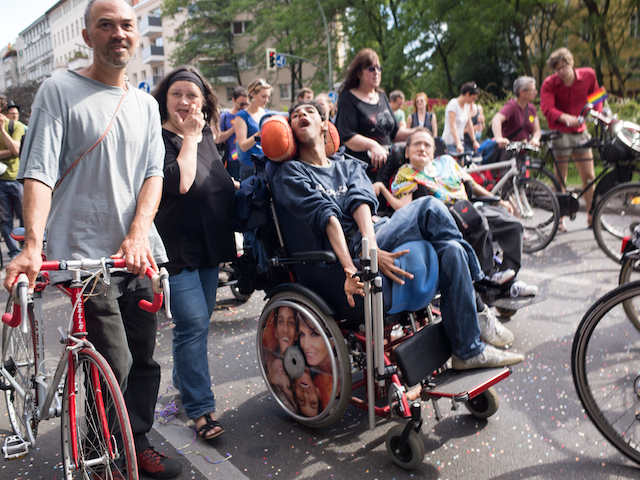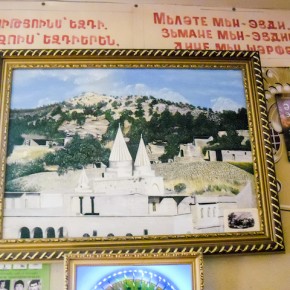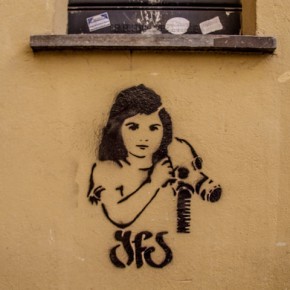Wheelchairs and rainbow flags blocked Berlin’s Kotbusser Damm. Equal parts pride parade and disabled rights protest, the pairing made sense. This was an in-gathering of the margins, not normally linked at this level, considering the degree of recognition accorded gays and lesbians today. Their equalization was a strong reminder of the shared discrimination both communities could once claim in the Nazi era.
As brilliant a mix as it was, there was something even more profound about the march. It was not so much its historical significance, as a sign of overcoming, as much as it was a demonstration of solidarity, across communities. Arm in arm, handicapped persons waving anti-homophobia placards, the empathy and the identification it communicated articulated a gesture fundamental to the left: solidarity, a word often associated with the anti-Communist Polish workers movement of the same name, but one indelibly linked with socialism.
The following flyers and translations, hearken back to that era, pointing out, in a decidedly partisan fashion, the anti-capitalist roots of a tradition of community, on the left, that has its most obvious roots in the 19th century, but goes all the way back to ancient Athens, and the notion of Agape, or neighborliness. Now unfashionably cast, in a largely discredited rhetoric of identification with the working class, this idea of closing ranks still resurfaces at different times, in different contexts, like that of the disabled persons-LGBT demo.
Where else would it be more appropriate than a city largely identified as the Jerusalem of the left, the red city of Berlin, which claims a far longer progressive tradition than just that of the fascist politics of the Third Reich, which it remains identified with, however justifiably.

Solidarity is an affectionate revolution of subversion!
You ask me: “What should we do, how can we oppose being subjected to laws, control, repression and normalised violence? What resources do we have to counter the authorities, uniforms and weapons, the monsters of technology, their laws and morals based on force, guilt and anger?”
I tell you: “I do not know the answer, the right way or the perfect strategy and I do not think there is such a thing. But I know that there is mutual aid, respect, love and solidarity, feelings that have become dangerous and rebellious. I know that the only thing stronger than our desire for freedom is the hatred of those that take it away. I know that no excuse is necessary for the uprising, and that not a minute can be wasted! I know that now there are thousands of reasons for the revolution!”
Solidarity with Sonja and Christian, who are being persecuted because of their stance against the state and are being incarcerated and incriminated, part of the Revolutionary Cells (RZ) and known for their struggles in the 1970s.
Solidarity with Sibylle, who was threatened with coercive detention because she refused to cooperate with the repressive authorities.
We embrace those who are accused and confined for their ideas and struggles. We embrace those who have not betrayed or forgotten their ideas for a free life!

Prisoner in Californian hunger strike has died
Solidarity with the hunger strikers
Prisoner Billy Michael Sell died at the age of 32 on Monday 22 July 2013 in Cororan, a Californian State Prison. He took part in a hunger strike with approximately 30,000 prisoners which began on 8 July 2013 in most US prisons, calling for an end to solitary confinement.
His fellow prisoners are mourning his death and supports are questioning the exact circumstances.
US Prison Authorities (CDCR) would like to classify his death as suicide and opened an investigation to that effect.
According to his fellow prisoners, Billy Michael Sell asked for medical assistance in the days before he died. They described him as a “strong” and “positive” person and doubt the authorities’ account in which his death was suicide. They argue that “it was completely against his nature” to do such a thing. The hunger striker’s supporters and relatives are distraught over his death and claim that the prison authorities are responsible because they refused to let them negotiate with the prisoner.
The hunger strike lasted about 21 days. The prisoners’ supporters have called for a worldwide day of solidarity with the prisoners in California next Tuesday. They hope that many nonviolent actions and images of support from across the world will make it clear to the authorities that the torture of solitary confinement and the resistance of prisoners across the US has been heard.
The prisoners are appealing for support for the implementation of five demands for which they are willing to risk their lives:
- An end to group punishment and administrative abuse
- An end to the debriefing policy and to change active and passive gang criteria
- An end to long-term solitary confinement in accordance with the recommendation of the US Commission on Safety and Abuse in America’s Prisons (2006)
- Provision of adequate and nutritious food
- Expansion and establishment of meaningful programs and rights for prisoners in Special Housing Units (SHU)
Besides public actions, in the past few days many people have directly called on the prison authorities to accept the demands of the resisting prisoners. Finally, they demanded to end retaliation measures against the prisoners’ delegated speaker and to grant entry to their trust attorney.
Californian Governor Edmund Brown has had to cut his summer holidays to Europe short. Whether he will face his political responsibility following the death of Billy Michael Sell or prisoners continue to die depends on the public’s reaction.
Solidarity with the hunger strikers –
grant the five demands!
Further information:
www.prisonerhungerstrikesolidarity.wordpress.com
Solitary confinement is torture – for a society without prisons!
Translated from the German by Kit Rickard. Photographs courtesy of Joel Schalit.





